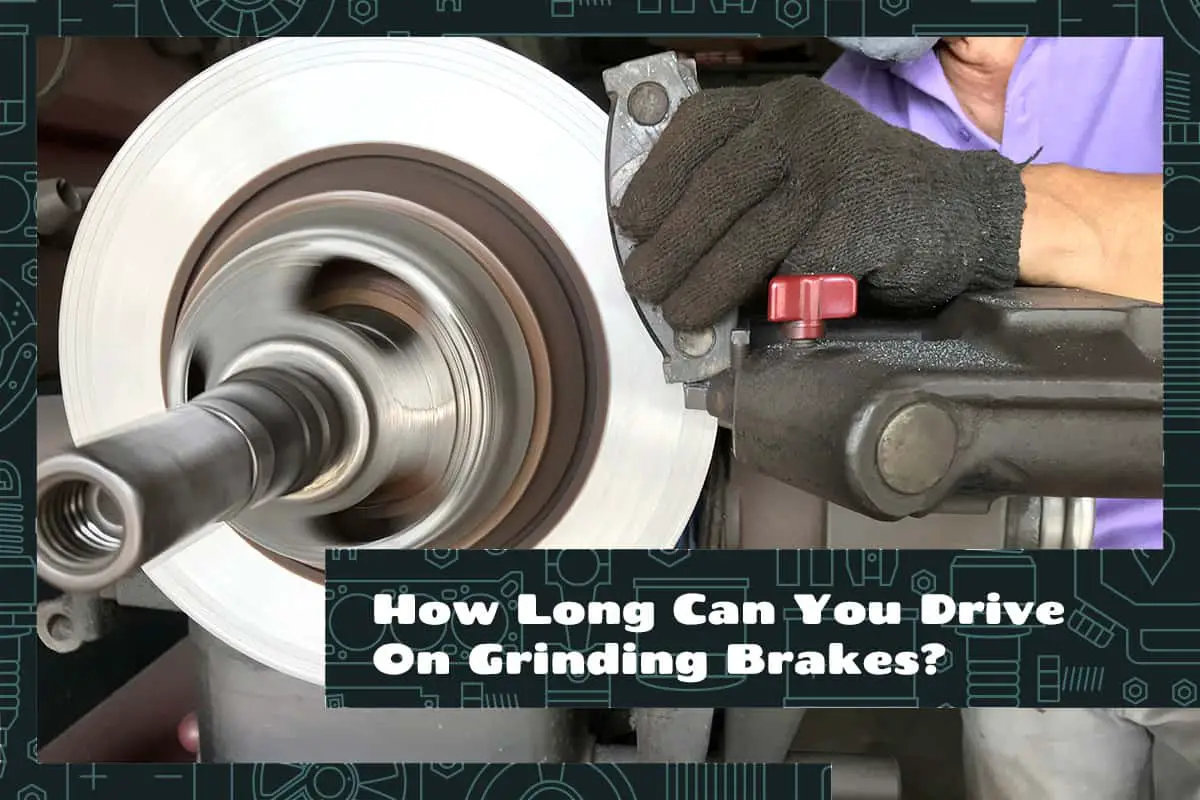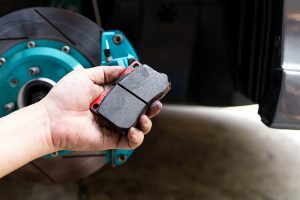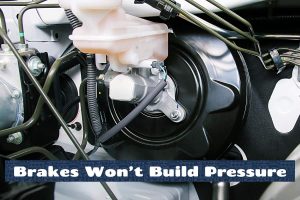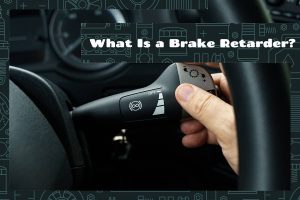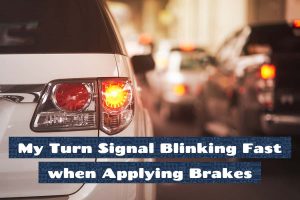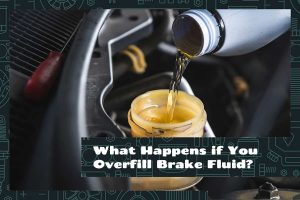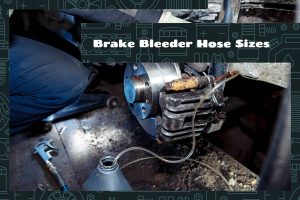Brakes ensure not only the driver’s safety but also that of other road users. A common issue that many motorists face is the grinding noise that emanates from the brakes. This sound is usually a distress signal, indicating that something is wrong with the braking system and warrants immediate attention.
Driving on grinding brakes can range from a few days to a week, depending on the cause and severity. Prolonged driving with this issue can result in reduced stopping power, potential brake failure, and damage to other car components.
This article will discuss the causes of grinding brakes, the consequences of this problem, and temporary solutions before you take your car to a trusted mechanic.
Causes of Brake Grinding
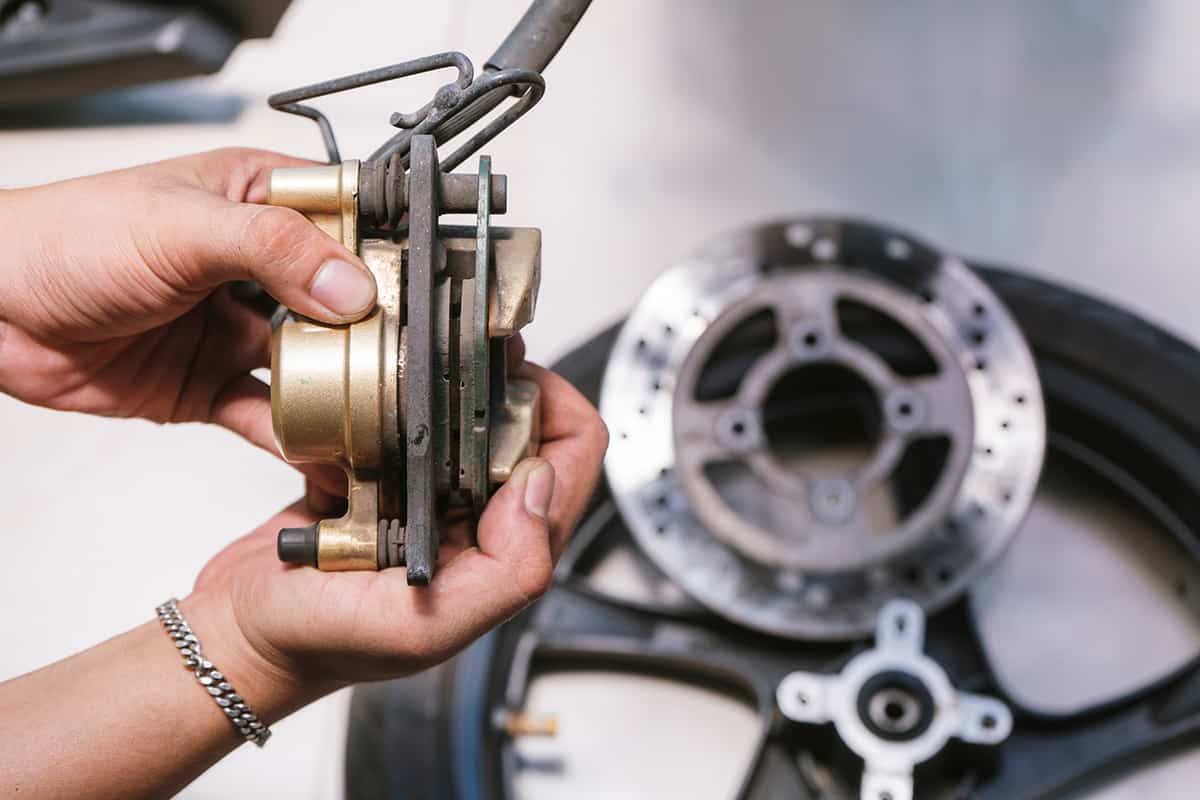
Brake grinding is an unmistakable sound that often signifies a problem within your vehicle’s braking system. To appropriately address the grinding noise, you should first pinpoint the underlying causes. Here’s a breakdown:
1. Worn-Out Brake Pads
Brake pads are designed with a metal wear indicator. When the padding wears down to a certain level, this metal piece contacts the rotor, producing a grinding noise to alert the driver of the need for replacement.
2. Foreign Particles in the Brake System
Sometimes, small rocks, road debris, or other foreign particles can get lodged between the brake pad and the rotor. When this happens, you’ll often hear a grinding noise. While the particles may be small, they can cause grooves and scratches on the rotor surface, leading to uneven brake wear.
3. Rust and Corrosion
If a car remains stationary for an extended period, especially in wet or humid conditions, rust can form on the brake rotors. Upon starting the vehicle and applying the brakes, you may hear a grinding noise. This is the brake pads working to scrape off the rust.
4. Damaged Rotors
Rotors are the disks that the brake pads clamp down on to stop the wheels. They can become warped or damaged, especially if exposed to excessive heat or if they experience high stress during sudden stops. Damaged rotors can lead to uneven brake pad wear, causing a grinding sound.
5. Misaligned Brake Components
If, for some reason, brake components are not aligned correctly, it can cause the brake pads to wear unevenly. This misalignment can lead to a grinding noise, especially if the pad rubs against parts it’s not meant to contact.
6. Lack of Lubrication
All moving parts in a vehicle require proper lubrication to function optimally. The brake system is no exception. If certain brake components lack proper lubrication, they can produce a grinding or squeaking noise when the brakes are applied.
The Immediate Effects of Driving on Grinding Brakes
Driving on grinding brakes is not just an annoyance; it’s a clear and present danger. The repercussions of ignoring these signals can be severe, which can be as follows:
1. Reduced Braking Efficiency
Once the pads are worn down and metal contacts metal, the vehicle doesn’t stop as quickly as it should. In situations where every second counts, like in sudden traffic stops, this reduced efficiency can mean the difference between a safe halt and a collision.
2. Heat and Damage to the Brake Rotors
When the brake pads wear down and grinding begins, the friction generated is no longer just between the pad and the rotor but between metal components. This increased friction produces excessive heat. This excessive heat can warp or even crack the rotors.
3. Potential for Brake Fluid Leaks
Brake fluid is essential for transmitting the force from the brake pedal to the brake pads. The excessive heat and friction generated by grinding brakes can cause damage to the brake lines and seals, leading to potential brake fluid leaks.
4. Increased Risk of Brake Failure
Perhaps the most alarming immediate effect of driving on grinding brakes is the increased risk of total brake failure. When key components like brake pads, rotors, and brake lines are compromised, the entire brake system can fail. This could result in the inability to stop the vehicle, which is a terrifying scenario no driver wants to experience.
How Long Can You Drive with the Noise?

While we don’t advise driving around on grinding brakes, it’s possible that you may get around for a few days or even weeks. Again, it depends on the severity of the issue.
Not all grinding noises indicate the same level of wear or damage. A soft, occasional grind might suggest that there’s a foreign particle caught in the brake system or early-stage wear of the brake pads. In such cases, you might have a little more leeway, perhaps a few days, to schedule a check-up.
On the other hand, a consistent, loud grinding points to more severe wear or even metal-on-metal contact, indicating that a visit to the mechanic should be immediate.
How to Temporarily Address Grinding Brakes
If you are unable to take your car to a mechanic immediately, there are a few temporary solutions you can implement to manage the situation.
1. Reduce Your Driving Speed
Higher speeds require more braking force, intensifying the grinding and the associated damage. Driving at a slower pace applies less pressure on the already compromised braking system.
2. Avoid Sudden Stops
The more abruptly you need to stop, the greater the strain on your grinding brakes. When driving with compromised brakes, aim to coast to a halt. This means starting your braking process earlier than usual.
3. Check for Debris
Sometimes, the grinding noise is due to a stone, stick, or other debris caught between the brake pad and the rotor. If you’re comfortable doing so, you can inspect the brakes for visible obstructions. If you find any, carefully remove them.
4. Increase Following Distance
Keeping a more considerable distance from the vehicle in front of you provides more time to brake gently and avoid sudden stops. With grinding brakes, this additional space can be a lifesaver.
5. Use Engine Braking
For those driving manual transmission vehicles, engine braking can be a temporary ally. By downshifting to let the engine slow the car down, you can minimize the use of the actual brakes. While this isn’t a replacement for proper braking, it can assist in reducing the frequency of brake use.
